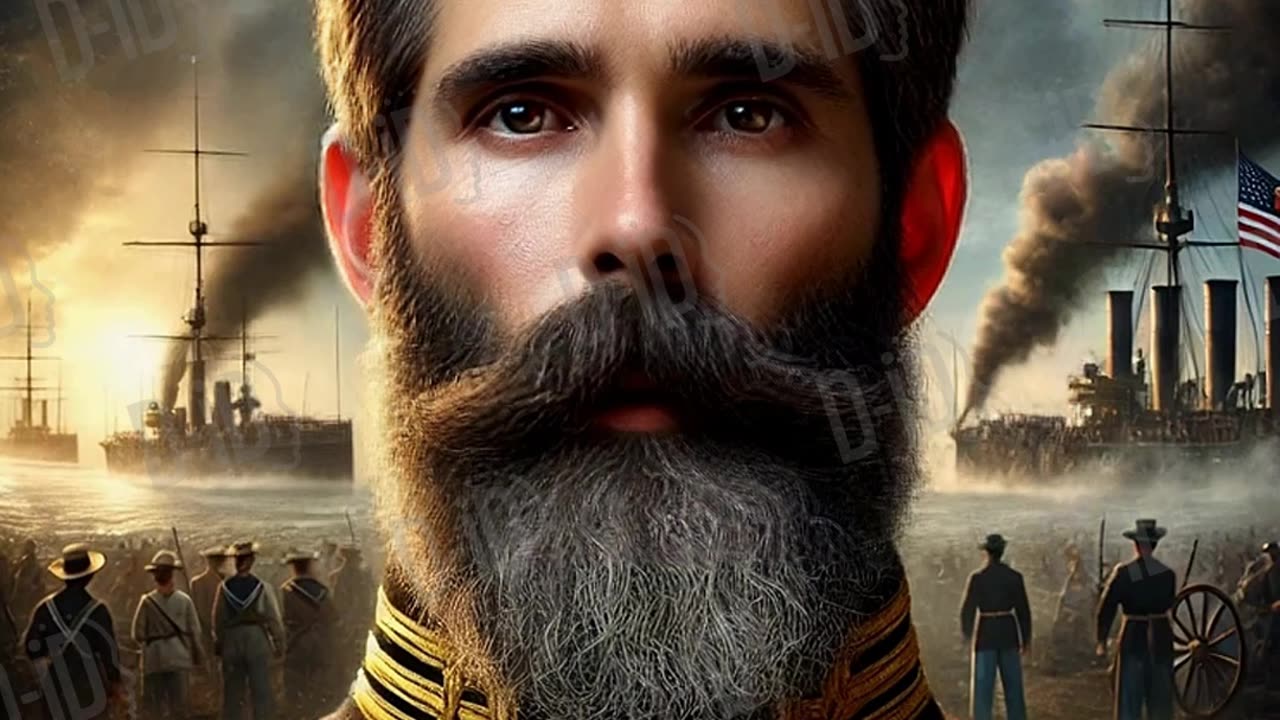Premium Only Content

Rear Admiral David Porter Tells His Story of his Naval Blockades During the Civil War1
Presented to you by: http://www.HistoricalConquest.com
Read more on our blog at: https://www.historicalconquest.com/blog
My name is David Dixon Porter, and I was an admiral in the Union Navy during the Civil War. My life was spent on the seas, leading daring naval operations, blockading Confederate ports, and helping turn the tide of the war. Let me tell you my story.
I was born on June 8, 1813, in Chester, Pennsylvania. You could say that the Navy was in my blood—my father, Commodore David Porter, was a famous naval officer from the War of 1812. From a young age, I knew I wanted to follow in his footsteps, and at just 16 years old, I joined the U.S. Navy.
Before the Civil War, I served all over the world, from the West Indies to the Mediterranean, learning the ins and outs of naval warfare. When the Civil War broke out in 1861, I was ready to serve my country. President Abraham Lincoln and Navy Secretary Gideon Welles knew the war wouldn’t be won on land alone—we needed to control the rivers and blockade Confederate ports to choke off their supplies. That’s where I came in.
One of my most important missions was helping seize control of the Mississippi River. In 1862, I commanded gunboats in the Battle of Forts Jackson and St. Philip, which allowed my good friend Admiral David Farragut to capture New Orleans—a huge victory for the Union. But my biggest challenge was yet to come.
In 1863, I was given a nearly impossible task: help General Ulysses S. Grant capture Vicksburg, Mississippi. The city was heavily defended, and the Confederates thought they were untouchable. But I wasn’t about to back down. I led my ironclad gunboats past enemy forts in the dead of night, dodging cannon fire to help Grant’s army get into position. With my Navy cutting off supplies from the river, Vicksburg surrendered on July 4, 1863. That victory split the Confederacy in two and gave the Union total control of the Mississippi River.
I didn’t stop there. In 1864, I was sent to attack Fort Fisher in North Carolina, the last major Confederate port still open for supplies. The first attack failed, but I wasn’t about to give up. In January 1865, we hit them again, harder this time, with a combined naval and army assault. Fort Fisher fell, and the Confederacy’s last lifeline was cut off.
After the war, I continued serving in the Navy and even became Superintendent of the U.S. Naval Academy, helping train the next generation of sailors. I also wrote books about my experiences, making sure that people understood the importance of naval power in shaping history.
I passed away on February 13, 1891, knowing that my Navy had played a crucial role in preserving the Union. Some called me bold, some called me stubborn, but I always did what it took to win. If there’s one lesson I want you to take from my story, it’s this: never back down from a challenge, even when the odds are against you. Thank you for listening.
Visit us at: https://www.historicalconquest.com/marketplace
#historicalconquest #history #historical #SecondIndependence #abolition #Freedom #Slavery #Liberty #Independence #Justice #Freedom #colonialera #colonialamerica #constitution #usconstitution #unitedstates #unitedstatesofamerica #wildwest #slavery #civilwar #war #abrahamlincoln
-
 0:59
0:59
The Historical Conquest Channel
1 day agoAllan Pinkerton Tells His Story as the First Private Eye Agency and Saving President Lincoln
7 -
 LIVE
LIVE
The Quartering
4 hours agoTrump's New IVF Order, GameStop CEO Denounces Wokeness Amid Sale, and Elon Musk's DOGE Role Revealed
4,013 watching -
 23:18
23:18
Crowder Bits
6 hours agoDebunked: John Oliver's Outrageous Lies About Trump 2.0
67K35 -
 LIVE
LIVE
Dr Disrespect
2 hours ago🔴LIVE - DR DISRESPECT - TARKOV - ZERO TO HERO PISTOL ONLY
3,111 watching -
 49:19
49:19
Miss Understood With Rachel Uchitel
22 hours agoKris Krohn: The Real Estate Playbook for Financial Freedom
25 -
 1:59:18
1:59:18
Russell Brand
3 hours agoThe Battle for Truth: Gregg Hurwitz on Myth, Power & Cultural Control – SF540
64.6K28 -
 2:00:46
2:00:46
Steven Crowder
5 hours agoFight! Major Lawsuit Announcement...
424K250 -
 19:50
19:50
Clownfish TV
15 hours agoFacebook FIRED 'Underperforming' Employees and They're P*SSED!
8134 -
 8:34
8:34
Dr. Nick Zyrowski
27 days agoWhat Happens If You Take High Dose NAC ( N-Acetyl Cysteine) For 14 Days
3.05K11 -
 25:31
25:31
The Boomer Effect
4 hours agoPotential Employees and Employers: What You Need to Know For The Hire
19